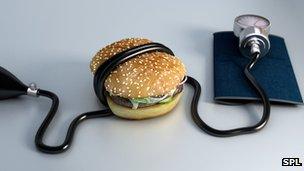Scrubbing Up: Do hospitals legitimise junk food?
- Published

Do hospitals need to do more about 'junk' food?
The "obesity crisis" in the UK has again made headlines this week. A report by the Academy of Medical Royal Colleges called for a range of measures from taxing sugary drinks to improving food in hospitals. A report by the group Sustain has also called for hospital food to meet mandatory nutritional standards. In the week's Scrubbing Up, Dr Aseem Malhotra argues that hospitals must lead by example.
It is demoralising to observe patients on daily ward rounds gorging on burgers, crisps, and chocolates, washed down with a sugary drink - the very food items that contributed to their admission in the first place.
When I recently told a heart attack survivor in his 50s that the can of coke he was drinking contained nine teaspoons of sugar, he replied "you sold it to me".
Like most clinicians I find it really quite appalling that many hospitals continue to have high street fast food franchises on site as well as corridors littered with vending machines selling junk food.
This sends out the wrong message and legitimises unhealthy food.
A study in the US found that families that made out patient paediatric visits were four times more likely to eat junk food (at any time of the day) if they visited a hospital with a fast food restaurant on site.
By legitimising the acceptability of junk food, hospitals have become a risk factor for obesity and diet related disease.
Drinks ban
There are a few beacons of good practice.
The Royal Brompton Hospital in London is a prime example where a team led by chief caterer Mike Duckett has worked to use their budgets to provide meals using fresh seasonal produce.
The Royal Bolton Hospital has successfully managed to not only ban the sale of large bottles of sugary drinks within the hospital grounds, but has improved the availability of healthy options in the hospital canteen by introducing a traffic light labelling system.
Of course patients deserve to be given nutritious meals, but hospital staff are also suffering from serious weight problems.
A recent report from the Royal College of Physicians revealed that half of the 1.4 million people who work for the NHS are obese.
Education alone is an ineffective strategy in tackling obesity and the food environment has a much greater impact on our eating habits than we give it credit for.
So why have we allowed hospitals to remain a branding opportunity for the junk food industry?

The common argument that chief executives and senior managers use to defend such practice is that the revenue from the sale of such products is used to "save lives".
But we don't sell alcohol to treat liver disease or cigarettes to treat lung cancer because it would be considered unacceptable.
Smoking parallels
In my view the smoking ban in public places was the greatest health legacy of the last Labour government.
Admissions to hospital due to asthma have halved and death rates from heart diseases have significantly reduced.
Under threat of regulation, food corporations make promises to behave better and proclaim their introduction of healthier options.
But even the ones marketed as "low fat" or "cholesterol lowering" are loaded with sugar which the latest evidence suggests is the most potent driver of obesity.
These companies have not promised to sell less junk food and find ever more creative ways of marketing foods to vulnerable populations, especially children.
It's therefore no surprise that last week the Lancet accused multinational food, drink, and alcohol industries of using similar strategies to the tobacco industry to undermine public health policies and suggested they should be regulated.
A government strategy of collaboration with the industry was described by one commentator as akin to asking a "burglar to install your locks".
There is no magic pill or silver bullet that is able to deal with the increasing burden of obesity and its related diseases which is costing the NHS £6bn each year.
Fatalism, pessimism, cynicism and complacency all support the status quo despite the fact that changes to lifestyle can have profound benefits to health even in the short term.
Politicians and the public have to decide for themselves whether they prefer to listen to the food corporations who are incentivised by profit or the voice of NHS doctors and health campaigners whose only motive is to protect your health.
It is time to regulate against the excesses and manipulations of the food industry to save lives and we must start in our own back yard.